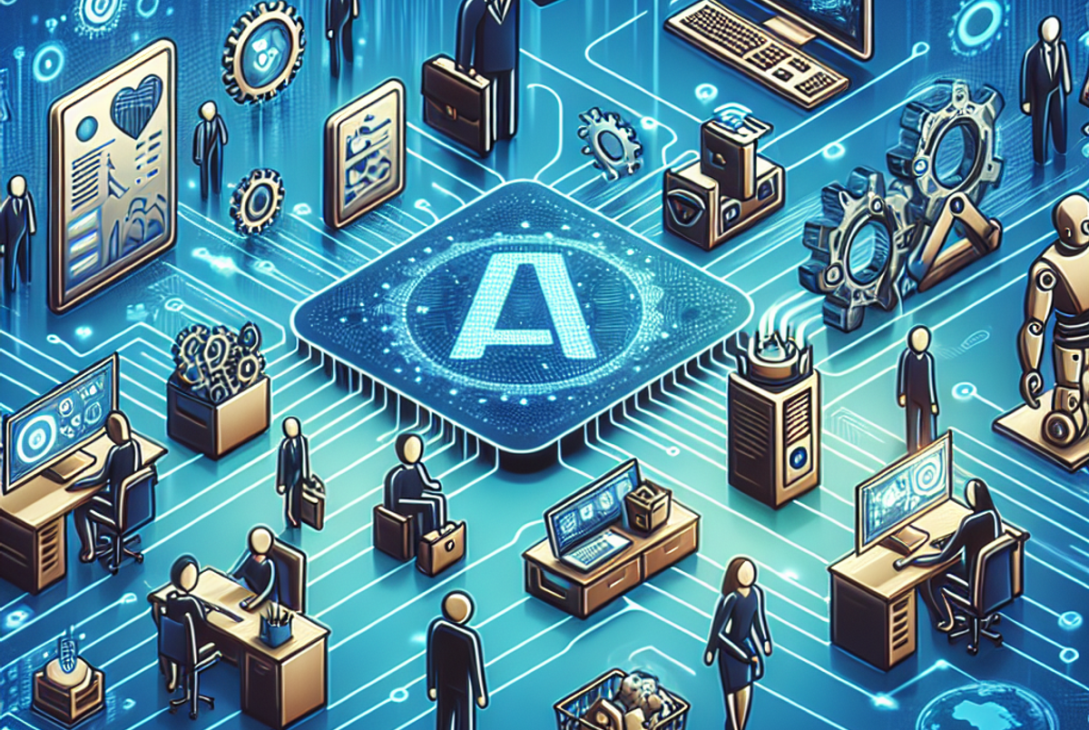Page Contents
- Why should you care?
- The Wharton AI Course: Big Data, AI, and Their Impact on Work
- Understanding Artificial Intelligence for Business Operations
- The Role of Ethical Considerations in Responsible AI Adoption
- Realizing the Potential: Successful Business Applications of Artificial Intelligence
- Overcoming Challenges in Implementing AI Strategies
- The Future Landscape of AI-powered Businesses
Welcome to the world of artificial intelligence, where machines learn to mimic human behavior, helping us solve complex problems with ease. Artificial Intelligence for Business is no longer a futuristic concept;
it’s a present-day reality transforming how businesses operate.
Why should you care?
Because AI is revolutionizing every industry, from finance to healthcare, retail to manufacturing. It automates routine tasks, analyzes massive amounts of data in seconds, and even predicts future trends based on historical patterns.
Imagine having a virtual assistant that never sleeps, tirelessly working behind the scenes to streamline your operations, boost productivity, and increase profits. That’s the power of AI in business.
Consider this: A recent study by McKinsey revealed that AI could potentially create $13 trillion in value annually across multiple business sectors by 2030.
So are you ready to embrace this digital transformation? If you wish to stay competitive and drive innovation in your industry, it’s time to integrate AI into your business strategy.
Let’s dive deeper into the realm of AI and discover how it can redefine your business operations.
The Wharton AI Course: Big Data, AI, and Their Impact on Work
Craving a deep-dive into the world of artificial intelligence? Look no further than the Wharton School’s popular course. Aptly titled “Big Data, AI, and Their Impact on Work“, this program offers a comprehensive introduction to AI and machine learning.

Esteemed Professor Kartik Hosanagar helms this course, bringing in a wealth of knowledge from his PhD studies and real-life application of these concepts. His approachable teaching method transforms complex theories into comprehensible nuggets of wisdom.
As participants navigate through the course material, they encounter crucial learnings in two main areas:
Understanding Artificial Intelligence for Business Operations
Artificial intelligence, the mimicry of human cognitive functions by machines, has made waves in the business world. Its applications are vast and transformative, particularly in automating tasks, enhancing decision-making processes, and driving data analysis for customer insights.
Automation of Tasks
One of the most significant benefits AI brings to business operations is the automation of tasks. Routine tasks that required hours of manual labor can now be performed efficiently by AI models, freeing up time for employees to focus on strategic activities. From predicting affiliate marketing trends to processing invoices, AI-powered automation accelerates operational efficiency and productivity.
Better Decision-Making
But AI’s contributions don’t stop at task automation. It also drives better decision-making. With predictive modeling and advanced analytics, AI helps businesses anticipate market trends and make informed strategic choices. For instance, it can predict affiliate marketing trends for 2023, providing businesses with insights to align their strategies for maximum returns.
Data Analysis for Customer Insights
Lastly, data analysis for customer insights is another area where AI excels. By analyzing vast amounts of customer data, AI can identify patterns and trends that might otherwise remain unseen. This enables businesses to understand their customers better, tailor their offerings accordingly, and create personalized experiences that boost customer satisfaction and loyalty.
In essence, understanding the implications of AI for business operations is not just about recognizing its capabilities. It’s about leveraging these capabilities to drive growth, efficiency, and competitive advantage.
The Role of Ethical Considerations in Responsible AI Adoption
In the realm of AI for business management, ethics emerge as a crucial aspect. AI’s transformative potential brings with it a myriad of ethical implications. It raises questions about privacy, accountability, transparency, and fairness. For instance, how should we handle biases in AI decision-making algorithms? What measures can be taken to ensure data privacy when AI is analyzing vast amounts of personal information?
Ethics of AI in Management: A Double-Edged Sword
AI can streamline operations and boost efficiency but it can also amplify existing biases if not properly monitored. Bias in AI can lead to unfavorable outcomes that disproportionately affect certain groups. Mitigating these issues requires input from diverse stakeholders to ensure fair representation.
Governance Frameworks for Sustainable AI: The Need of the Hour
A robust governance framework is essential for responsible and fair AI practices. These frameworks should guide the design, development, deployment, and monitoring phases of AI systems. They should establish clear roles and responsibilities for data handling and decision-making processes.
To illustrate, Google’s AI Principles provide a strong example of an ethical framework guiding their work in artificial intelligence and machine learning.
- Be socially beneficial: AI applications should benefit society and avoid harmful uses.
- Avoid creating or reinforcing unfair bias: Fairness is crucial in AI systems to avoid unjust impacts on people.
- Respect privacy: Respect for privacy must be paramount when dealing with user data.
- Uphold high standards of scientific excellence: Rigorous methodologies must underpin all work on AI.
This crystal-clear articulation of principles serves as a compass for everyone involved in the development and deployment of AI solutions within their organization.

In the long run, striking a delicate balance between leveraging AI capabilities for business growth while safeguarding ethics will greatly determine the success of artificial intelligence adoption.
Realizing the Potential: Successful Business Applications of Artificial Intelligence
Artificial Intelligence has made its mark in various sectors, transforming the way businesses operate and opening new avenues for innovation. Let’s delve into key areas where AI is making significant strides.
Marketing
AI plays a critical role in shaping marketing strategies with predictive analytics, customer segmentation, and personalized recommendations. For instance, Netflix uses AI to recommend shows based on viewing habits, significantly improving user engagement and retention.
Supply Chain
Automation of inventory management, demand forecasting, and logistics planning are just a few ways AI enhances supply chain efficiency. Tech giant Amazon leverages AI in its warehouses for sorting and packing items, resulting in faster delivery times.
Now, let’s turn our attention to successful business applications of AI in action.
- Starbucks: This global coffeehouse chain uses predictive analytics to personalize offers for its customers – an application of AI that has bolstered their customer loyalty program.
- American Express: Utilizing machine learning algorithms, American Express analyzes historical transaction data to detect fraud in real-time – a game-changer for maintaining trust in the financial industry.
While these applications paint an optimistic picture of leveraging AI for business advantage, the road to successful implementation comes with its own set of challenges.
Overcoming Challenges in Implementing AI Strategies
Even as we marvel at the wonders that Artificial Intelligence brings to the business landscape, there are still hurdles to overcome. One of the most pressing issues is the skills gap in AI implementation.
The Skills Gap in AI Implementation
A recent survey revealed that 69% of enterprises believe they lack the skilled personnel needed to implement AI effectively. This gap can be bridged through targeted upskilling and strategic talent acquisition. Businesses must invest in training programs to equip their current employees with necessary AI skills. Onboarding AI specialists is also crucial for companies looking to innovate with this technology.
Ensuring Data Quality and Privacy
However, skills aren’t the only challenge. As businesses integrate AI into their operations, ensuring data quality and privacy becomes paramount. Poor data quality can lead to inaccurate insights, affecting decision-making processes while privacy concerns can erode trust among customers and stakeholders.
To address these challenges, businesses should:
- Implement robust data management practices
- Use advanced tools for data cleaning and validation
- Ensure compliance with data protection regulations

Incorporating these strategies can help achieve a successful transition towards an AI-driven business model.
While navigating these challenges may seem complex, it is important to remember that overcoming them paves the way for reaping the benefits of AI. As with any transformative technology, preparation and adaptation are key.
The Future Landscape of AI-powered Businesses
The future of AI in business strategy is not just a distant dream — it’s a rapidly approaching reality. Here’s how the narrative of artificial intelligence is unfolding across the business landscape:
1. Emerging Trends in AI Adoption
Businesses are racing to integrate AI into their strategic planning, with data-driven decision-making at the forefront. As machine learning algorithms become more sophisticated, we’re seeing a shift towards predictive and prescriptive analytics, which not only forecast trends but also suggest actionable strategies.
2. AI as the Architect of Business Strategy
Imagine a world where AI tools are the masterminds behind market expansions, risk assessments, and customer relation improvements. With their ability to crunch enormous datasets and derive insights beyond human capacity, these intelligent systems are redefining how companies craft their long-term goals.
3. Synergy Between Man and Machine
The alliance between human creativity and AI’s analytical prowess is creating hybrid operational models where strategic decisions are both human-inspired and data-endorsed.
4. Artificial Intelligence and Affiliate Marketing
In the realm of digital marketing, artificial intelligence is reshaping how brands approach affiliate marketing. For instance, insights on affiliate marketing trends showcase the integration of AI in understanding consumer behavior, predicting campaign success rates, and automating tedious tasks for marketers.
5. AI-Powered Personalization in Marketing
Leveraging AI for hyper-personalized experiences is not just a trend; it’s becoming an industry standard. As outlined in affiliate marketing trends for 2023, businesses can analyze user data to tailor their affiliate marketing efforts to resonate with individual preferences — a strategy proven to drive engagement and sales.
Embrace the Intelligent Future of Business with Artificial Intelligence
As we witness this transformative era where artificial intelligence merges with business savvy, it’s evident that those who embrace this intelligent technology will thrive. AI is no longer just an operational tool; it has evolved to become an integral part of shaping visionary strategies that will lead businesses into an unprecedented era of innovation and growth.
FAQs: Artificial Intelligence for Business
What is the significance of artificial intelligence (AI) for businesses?
AI revolutionizes business operations by automating tasks, analyzing data, and predicting future trends. It enhances efficiency, productivity, and profitability across various industries.
How does AI benefit business operations?
AI automates routine tasks, facilitates better decision-making through predictive analytics, and provides insights from data analysis for customer segmentation and personalized marketing.

What are the ethical considerations in adopting AI for business management?
Ethical considerations include ensuring fairness, transparency, accountability, and privacy in AI systems. Addressing biases, establishing governance frameworks, and upholding ethical principles are essential for responsible AI adoption.
What are some successful business applications of AI?
AI is widely used in marketing for personalized recommendations and customer segmentation. It also enhances supply chain management through inventory automation and logistics planning, as seen in companies like Netflix and Amazon.
What challenges do businesses face in implementing AI strategies?
Challenges include the skills gap in AI implementation, ensuring data quality and privacy, and complying with regulations. Bridging the skills gap, implementing robust data management practices, and addressing privacy concerns are crucial for successful AI integration.
What does the future landscape of AI-powered businesses look like?
The future involves emerging trends in AI adoption, AI-driven business strategy formulation, synergy between humans and AI, reshaping digital marketing, and hyper-personalized customer experiences. Embracing AI technology will be key for businesses to thrive in this intelligent era of innovation and growth.
Last words
The future involves emerging trends in AI adoption, AI-driven business strategy formulation, synergy between humans and AI, reshaping digital marketing, and hyper-personalized customer experiences. Embracing AI technology will be key for businesses to thrive in this intelligent era of innovation and growth.
AI for corporate decision making AI in business AI technology for business growth AI-driven business transformation Artificial intelligence in corporate sector Business applications of artificial intelligence Business intelligence and AI Enterprise AI solutions Integrating AI into business models Machine learning for business Use of AI in business operations
Last modified: 23 April 2024






Normally I do not read article on blogs however I would like to say that this writeup very forced me to try and do so Your writing style has been amazed me Thanks quite great post
Thank you for your kind words! I’m glad you found the information interesting. If you have any specific questions about artificial intelligence for business or if there’s anything else you’d like to know, feel free to ask. I’m here to help!
Ive read several just right stuff here Certainly price bookmarking for revisiting I wonder how a lot effort you place to create this kind of great informative website
I’m glad to hear that you found the information valuable! Creating a great and informative website does indeed require effort, and it’s great to know that you appreciate the content. If you have any specific questions about artificial intelligence for business or if there’s anything else you’d like to discuss, feel free to let me know!
Simply wish to say your article is as amazing The clearness in your post is just nice and i could assume youre an expert on this subject Well with your permission let me to grab your feed to keep updated with forthcoming post Thanks a million and please carry on the gratifying work
Thank you for your kind words! I’m glad you found the information valuable. If you have any specific questions about artificial intelligence for business or any other topic, feel free to ask. I’m here to help and provide information.
Excellent blog here Also your website loads up very fast What web host are you using Can I get your affiliate link to your host I wish my web site loaded up as quickly as yours lol
Thank you, Brando! Delighted you enjoyed the AI for Business blog. Here’s my affiliate link: here. Enjoy fast loading! – Brando Effertz”
helloI like your writing very so much proportion we keep up a correspondence extra approximately your post on AOL I need an expert in this space to unravel my problem May be that is you Taking a look forward to see you
Hello! Thank you for your kind words. I’d be glad to help. Let’s connect and discuss further. Looking forward to assisting you. – sakkemoto
I’m so grateful for the knowledge you’ve shared here.
Hello Caleb Gerhold! I’m pleased to hear that you found the information on artificial intelligence for business valuable. If you have any specific questions or if there’s anything else you’d like to learn or discuss regarding AI and its applications in business, feel free to let me know. I’m here to help and provide information!
Usually I do not read article on blogs however I would like to say that this writeup very compelled me to take a look at and do it Your writing style has been amazed me Thank you very nice article
Hello Jaquelin Tremblay! I’m glad to hear that you found the article compelling and that it encouraged you to take a closer look. If you have any questions about artificial intelligence for business or if there’s anything specific you’d like to discuss on the topic, feel free to let me know. I’m here to help!
you are in reality a just right webmaster The site loading velocity is incredible It seems that you are doing any unique trick In addition The contents are masterwork you have performed a wonderful task on this topic
Thank you, Stacey! Delighted to hear you appreciate the insights on artificial intelligence for business. Your kind words inspire! – Stacey Dietrich
I have been surfing online more than 3 hours today yet I never found any interesting article like yours It is pretty worth enough for me In my opinion if all web owners and bloggers made good content as you did the web will be much more useful than ever before
[…] day, you might become the next superhero prompt engineer, creating AI wonders that will amaze the world! Embrace your creativity, and let your imagination soar as you unlock the […]